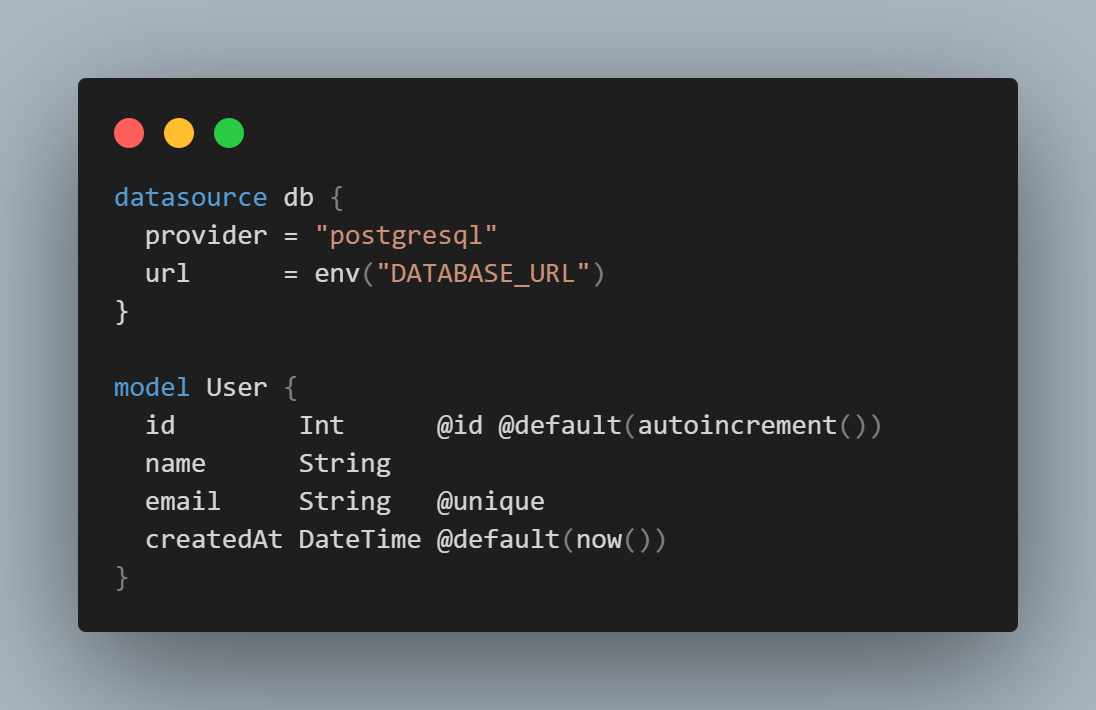Using Node.js with Prisma ORM for PostgreSQL
Posted by Kosal

When working with PostgreSQL in Node.js, developers seek tools that simplify database access while providing type safety, performance, and a great developer experience. Prisma ORM is a modern solution that fits this need.
In this guide, you'll learn how to integrate Prisma with a Node.js application using PostgreSQL. This version includes a custom Prisma client output path and how to correctly import it.
What is Prisma?
Prisma is a next-generation ORM for Node.js and TypeScript. It offers:
- Type-safe database queries
- A clean data modeling syntax
- Auto-generated query client
- Easy schema migrations
- Compatibility with PostgreSQL, MySQL, SQLite, SQL Server, and MongoDB
Prerequisites
- Node.js (v18 or newer)
- PostgreSQL database
- npm (Node package manager)
- Basic understanding of JavaScript
Step 1: Initialize Your Project
Create and initialize a new Node.js project:
mkdir prisma-postgres-app
cd prisma-postgres-app
npm init -y
Step 2: Install Prisma
Install Prisma CLI and Prisma client:
npm install prisma --save-dev
npm install @prisma/client
Then initialize Prisma:
npx prisma init
This creates the following:
.envfile (for environment variables)prisma/schema.prisma(for defining your data model)
Step 3: Configure PostgreSQL Connection
Open .env and set your database connection URL:
DATABASE_URL="postgresql://username:password@localhost:5432/mydatabase"
Replace the placeholder values with your actual database credentials.
Step 4: Define the Data Model
Edit prisma/schema.prisma to define your database schema. Here's an example User model:
generator client {
provider = "prisma-client-js"
output = "./generated/prisma"
}
datasource db {
provider = "postgresql"
url = env("DATABASE_URL")
}
model User {
id Int @id @default(autoincrement())
name String
email String @unique
createdAt DateTime @default(now())
}
⚠️ Note: The output line customizes where the Prisma Client will be generated.
Step 5: Apply the Schema to the Database
Run a migration to create the necessary tables:
npx prisma migrate dev --name init
Alternatively, if you want to push the schema without creating a migration:
npx prisma db push
Step 6: Generate Prisma Client
Generate the Prisma client based on your schema:
npx prisma generate
This will generate the client in the ./generated/prisma folder.
Step 7: Create and Run Your App
Create a file named index.js and write the following code:
const { PrismaClient } = require('./generated/prisma'); // <- Custom path
const prisma = new PrismaClient();
async function main() {
// Create a user
const user = await prisma.user.create({
data: {
name: 'Kosal',
email: 'kosal@example.com',
},
});
console.log('Created user:', user);
// Read all users
const users = await prisma.user.findMany();
console.log('All users:', users);
}
main()
.catch((e) => {
console.error(e);
})
.finally(async () => {
await prisma.$disconnect();
});
Then run the app:
node index.js
Expected output:
Created user: {
id: 3,
name: 'Kosal',
email: 'kosal@example.com',
createdAt: 2025-05-19T03:00:21.773Z
}
All users: [
{
id: 3,
name: 'Kosal',
email: 'kosal@example.com',
createdAt: 2025-05-19T03:00:21.773Z
}
]
This confirms that your Prisma setup is working correctly with PostgreSQL and the Prisma Client was imported successfully.
Step 8: Use Prisma Studio (Optional)
To visually browse and edit your data, use Prisma Studio:
npx prisma studio
This opens a local web interface at http://localhost:5555.
Common Gotcha: Prisma Client Not Found
If you see an error like:
@prisma/client did not initialize yet. Please run "prisma generate"
Make sure you're importing the client from the correct path:
- Default:
require('@prisma/client') - Custom output:
require('./generated/prisma')
Also, ensure you’ve run:
npx prisma generate
Conclusion
Prisma makes working with PostgreSQL in Node.js more efficient, type-safe, and enjoyable. With its powerful tools like schema modeling, code generation, and Prisma Studio, you can build robust applications quickly and confidently.
Whether you're building a small prototype or a full-scale production app, Prisma offers the right balance of flexibility and developer ergonomics.